89% of people think that happiness can be controlled.
A brand new survey of 1,155 respondents found that these people are 32% happier than those who don’t think that happiness can be controlled.
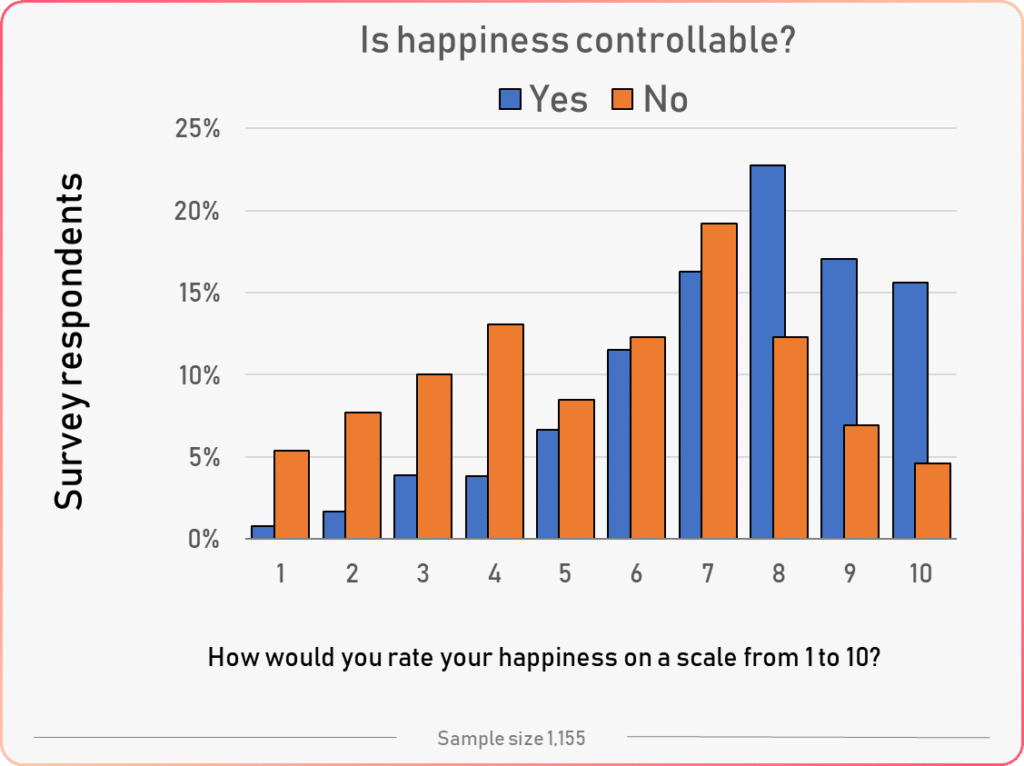
The average happiness rating of those who think happiness is controllable is 7.39. In contrast, the average happiness rating of people who think happiness is out of their control is 5.61.
Interestingly, people who think that happiness can be controlled are 32% happier on average.
Our study results dive into what makes these people different than others. What makes people feel in control of their happiness? How does that influence the happiness of these people?
(Click here to have a look at the summarized results of this study on our infographic!)
Happier people feel more in control of their happiness
Our survey questioned 1,155 respondents on their happiness, by asking specific questions:
- Is happiness something that you can control?
- If you look back at the last year of your life, how would you rate your happiness on a scale from 1 to 10?
On average, 89% of people answered that happiness is something that you can control.
More interestingly, unhappy people are less likely to feel in control of happiness.
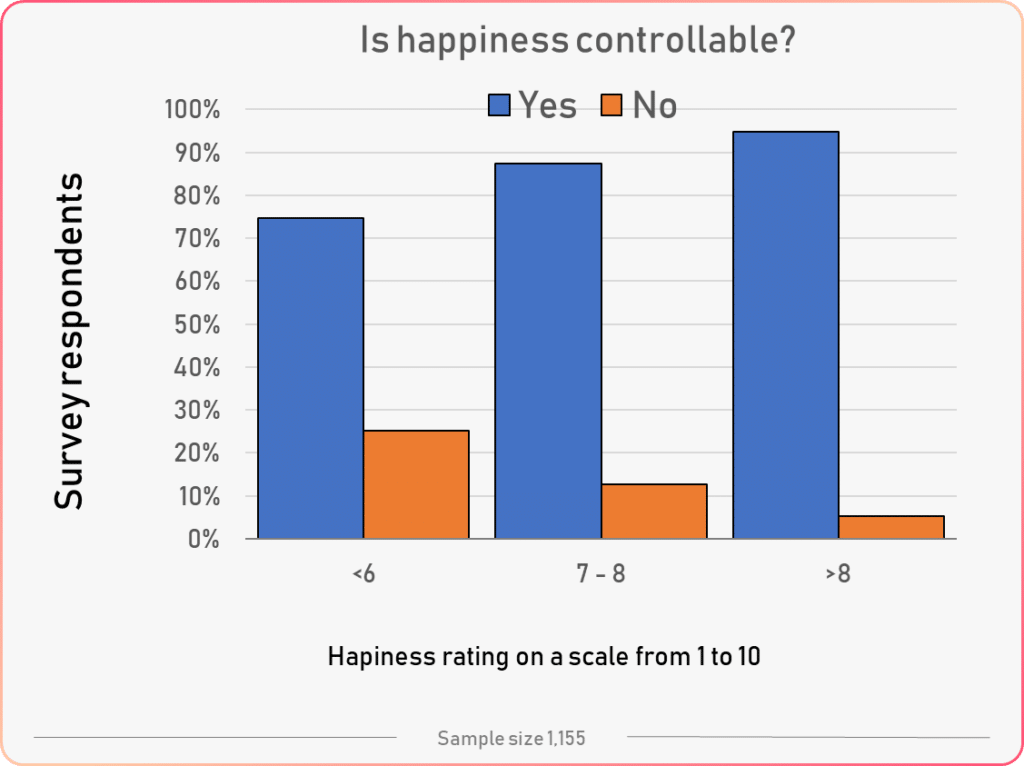
This chart groups respondents in 3 groups:
- Those who rated happiness with a 6 or lower (n=364).
- Those who rated happiness with a 7 or 8 (n=441).
- Those who rated happiness with a 9 or 10 (n=350).
Or in other words, people who rate their happiness levels as low, medium or high.
People with low happiness ratings are 5 times more likely to feel like happiness is out of their control compared to people with high happiness ratings (20.33% versus 4.29%).
What experts say…

Andy Cope, Teacher, author and happiness expert @ Art of Brilliance
In a world where wellbeing is in short supply, it’s great to see evidence that your individual happiness may be more controllable than you think. This research ties in with my own. It hints at the fact that the happiest people have learned and implemented strategies that give them a better chance of having a great day. In essence, these strategies inoculate happy people against whatever the world throws their way.
What factors influence control over our happiness?
People that feel like happiness can be controlled tend to be 32% happier than those who think otherwise.
We want to find out what makes these people different. Which groups of people are more likely to feel in control of their happiness? And which groups of people are happier as a result? If you want to know how to be happy, what can you do to control your happiness more?
To find out, we asked each respondent a number of demographic questions, ranging from gender to employment status. How did these affect the ability to control our happiness?
Gender doesn’t influence control over your happiness
There was no difference between genders. Both male and female respondents showed the same results. 89% of people think that happiness is controllable.
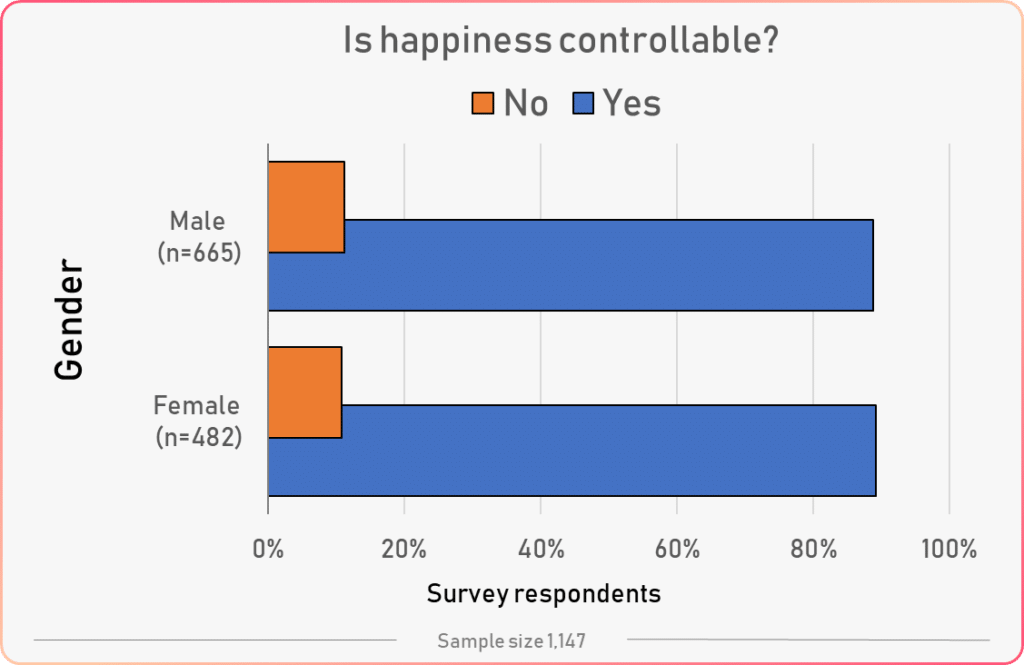
Some would say that women are more prone to swings in mood, caused by hormonal swings. A thesis would be that women, as a result, are less in control of their happiness. This thesis is not supported by our results, and women are just as in control of their happiness as men are.
Control over happiness changes as you age
Age seems to have a significant influence on the average respondent. The amount of control we have over our happiness decreases in our mid-life and increases as we grow older again.
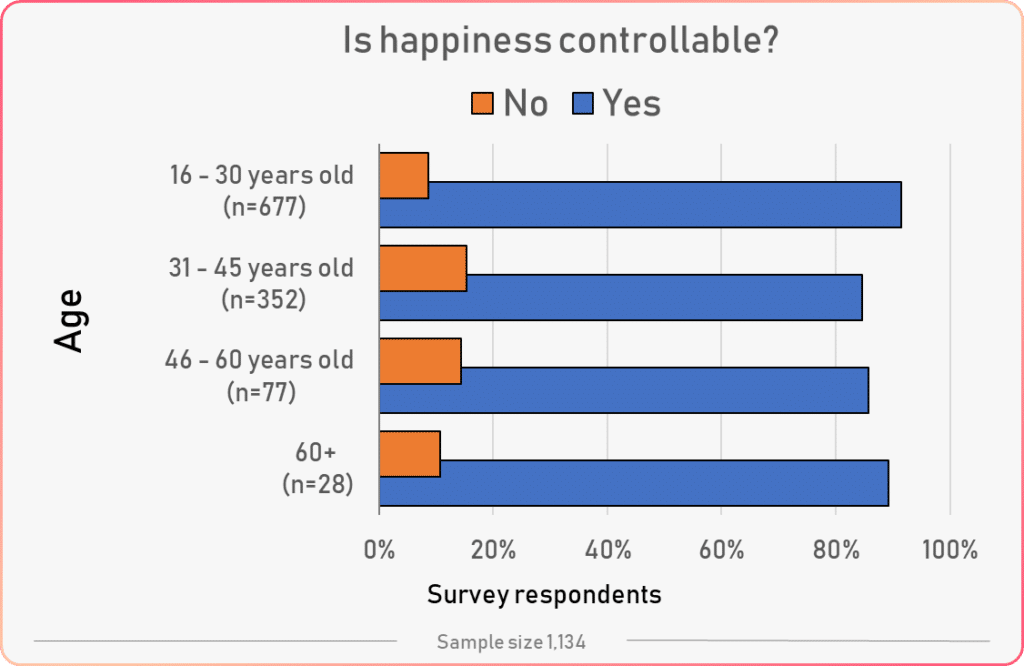
- 16-30 years old: out of the respondents, 91% thinks that happiness is controllable.
- 31-45 years old: out of the respondents, 85% thinks that happiness is controllable.
- 45-60 years old: out of the respondents, 86% thinks that happiness is controllable.
- 60+ years old: out of the respondents, 89% thinks that happiness is controllable.
This finding corresponds with the well-researched U-curve in happiness.
In general, happiness decreases from age 18 and reaches a peak unhappiness at approximately age 47. From there, the happiness levels gradually increase again.
Our survey corresponds with this U-curve. On average, respondents indicated that they feel less in control of their happiness when they are between 30 and 60 years old. Control over happiness increases at an older age again.
Since control over happiness is correlated to higher happiness levels, this result is similar to the U-curve of happiness that is observed around the world.
Education vs control over happiness
High school graduates generally have a harder time controlling happiness.
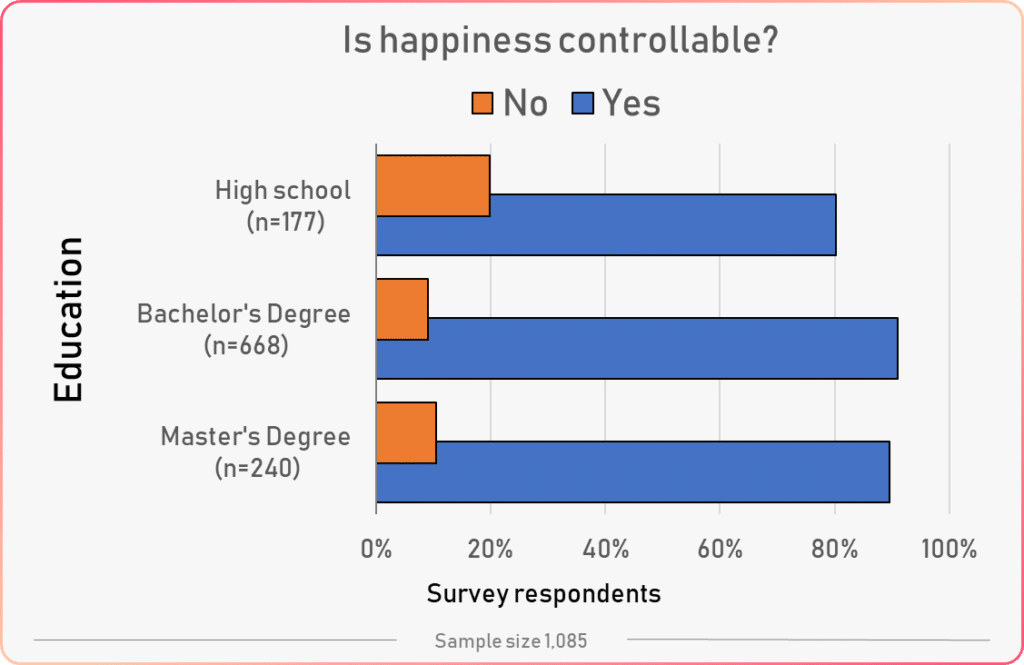
We surveyed the respondents about their educational background:
- What is the highest degree or level of education you have completed?
Answers showed a slight correlation between educational background and higher control over happiness. On average, a high school graduate feels less in control over happiness when compared to a Bachelor’s or Master’s graduate.
What experts say…

Tim Sharp, Chief Happiness Officer @ The Happiness Institute
On the one hand, the results of this study need to be interpreted cautiously because as the authors note, the findings imply correlation and not necessarily causation. At the same time, however, they’re consistent with numerous other findings that imply we definitely have some control over our happiness; and that focusing on this element of control is helpful. Happiness is undeniably desirable and beneficial; anything that helps us enjoy more of it can only be a good thing.
Married people have more control over happiness
Even though married people are less “free” (they share their lives with a partner), they still feel like they have more control over their own happiness.
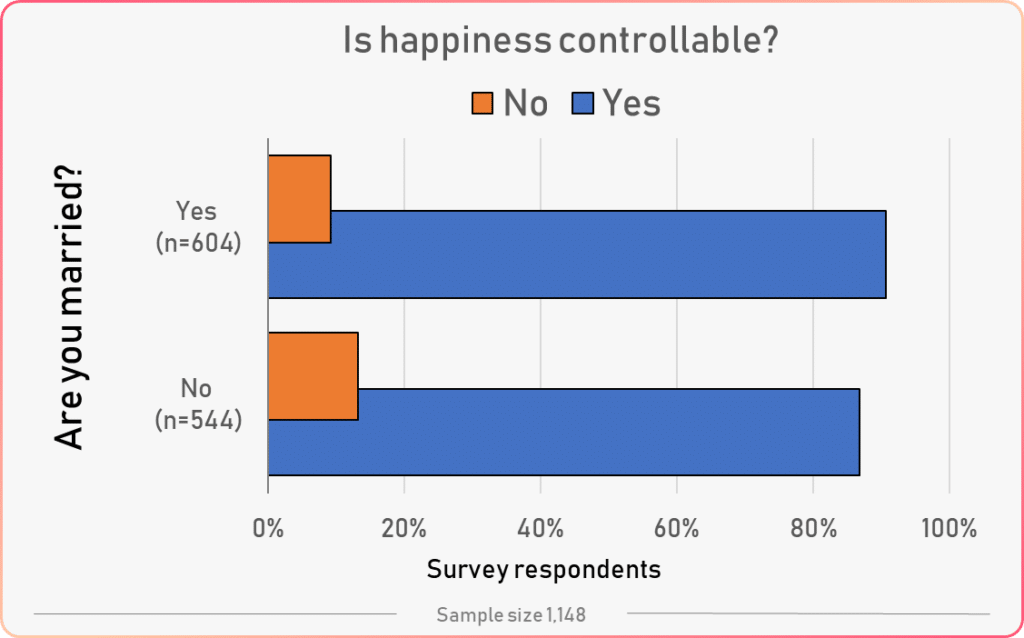
This is most definitely a good example of a correlation that doesn’t prove causation.
It’s more likely that married people are happier, and as a result, are more inclined to feel in control of their happiness.
In the words of Daniel Gilbert, psychology researcher and best-selling author:
Married people are happier than unmarried ones, perhaps because the single best predictor of human happiness is the quality of social relationships.
Daniel Gilbert
Students have the least amount of control over their happiness, employed people the most
Students have the least amount of control over their happiness. Employed people (full-time and part-time) feel most in control of their happiness.
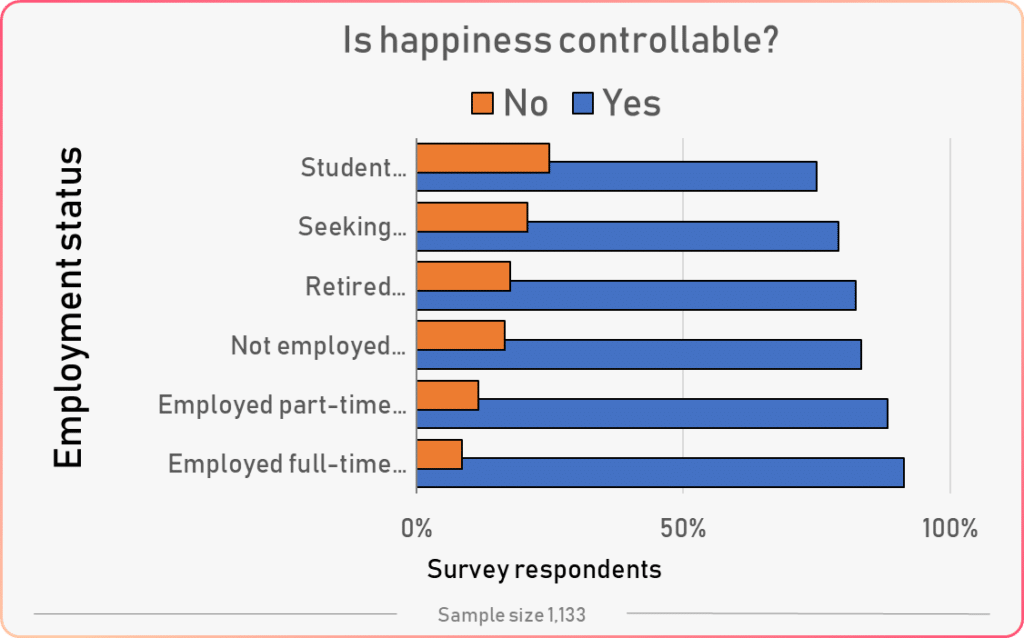
Respondents were asked the following question:
What is your current employment status?
They were able to choose out of the following answers:
- Employed full-time (n=836)
- Employed part-time (n=138)
- Not employed (n=42)
- Retired (n=17)
- Seeking opportunities (n=48)
- Student (n=52)
- Prefer not to say (n=22)
The answers suggest that between finishing college (student) and finding a job (employed), your control over happiness increases from 75% to 90%.
Even though sample sizes are skewed, it is interesting to see that retired people are not the most controlling.
A thesis would be that retired people are more in control of their happiness since they have the least amount of occupational responsibilities. This is not supported by the responses, but this may also be a result of the age-dependency of happiness (U-curve).
How much of our happiness can actually be controlled?
Just exactly how much of our happiness is within our control has been studied by others as well.
The most prominently quoted figure is that we can control 40% of our happiness, simply by managing our internal state of mind.
The truth is that the amount of happiness that we can control varies from person to person, and even from time to time. Some people are less inclined to control their happiness compared to others.
Even more so, the amount of control we have over our happiness changes over time. We are less inclined to control our happiness when faced with crushing news (for example, the death of someone close).
What experts say…

Alex Cencerrado, Senior Data Analyst @ Happiness Research Institute
Very interesting study! These results are aligned with the World Happiness Ranking from the United Nations. One of the six main factors explaining the differences in happiness is the “freedom to make life choices”.
I guess, when people think about their ability to make life choices, what they mean is their ability to do what makes them happy. If you can decide where to go on vacation or whether to live in the city or in the countryside, you will probably be happier.
But being able to choose between many options is not always the best way to be happy. Sometimes, it’s just better to not know what other options you have. The “agony of choice” is a well-known term by happiness researchers and especially supermarkets practice this.
When you face people with two kinds of jam, they will probably buy one of the two; when you face people with 23 kinds of jam, they will probably buy nothing. The reason is that we prefer to not make a decision, rather than making a decision and regretting it because we could have chosen something better.
When people say “happiness can be controlled”, it’s probably only because they have the economical resources to control where to go on vacation or what to study, but also because they do not know all the possible lives they could live.
Causation vs correlation
Something that we need to address is the difference between causation and correlation. Even though there is a correlation between controlling happiness and actually being happy, that doesn’t mean that one causes the other.
Do happy people feel more in control of their happiness?
Do people in control of their happiness feel happier?
Or alternatively, is this entire study a result of the self-serving bias? The self-serving bias is the habit of a person taking credit for positive events or outcomes, but blaming outside factors for negative events.
Based on the survey results, it’s impossible to conclude that one is a definitive cause of the other. For that, we would have to do a qualitative study with all the respondents. That’s not the scope of this study.
Either way, there is a clear correlation between feeling in control of your happiness and actually feeling happy. Which results in the following lesson:
If you’re currently unhappy, try to find areas where you can be in control of your happiness. Then focus on improving those areas. Based on the survey results, you are more inclined to feel happy when you’re in control of these areas in your life.
Methodology
If you’re looking for more information on how the study was performed, this article provides an overall introduction to this study. It also includes links to other result articles that are relevant to this study.
Want to know more details? Like who was surveyed, what are the demographics of the respondents, and how the study was performed? Here is a link to a document that explains it all (opens in a new window):
Infographic of our study
The infographic below summarizes the key takeaways from our study.
Use the following embed code to share this infographic on your website:
<div style="“clear:both”">
<a href="https://www.trackinghappiness.com/controlling-happiness-new-study-results/"><img src="https://www.trackinghappiness.com/wp-content/uploads/2020/07/controlling-happiness-study-infographic-2.jpg" data-spai="1" alt="infographic of results of our study about controlling happiness" width="675px" border title="Controlling Happiness: A Study of 1,155 Respondents"></a></div>
<div><strong>Courtesy of <a href="https://www.trackinghappiness.com/">Tracking Happiness</a></strong></div>Closing words
People who are in control of their happiness are 32% happier on average. In addition, this survey provides more insights as to what makes these people different. What are the personal factors that influence how much we can control our happiness?
If you want to be happier, you should focus on improving the aspects of your life which you can control.
What did you think of these results? Let us know in the comments below!
Tracking Happiness, 2020. Controlling Happiness Correlates With 32% Higher Happiness (New Study Results). [online] Tracking Happiness. Available at: https://www.trackinghappiness.com/controlling-happiness-new-study-results/ [Accessed 20 July 2020]

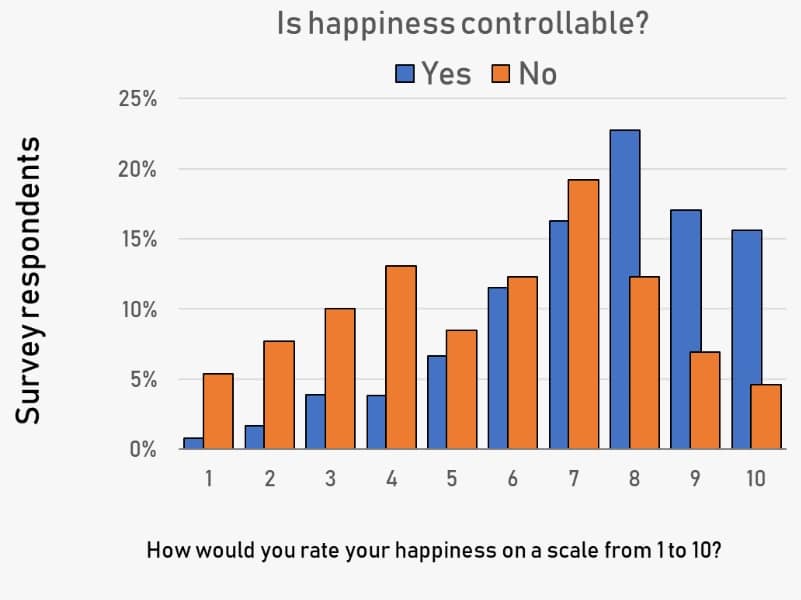
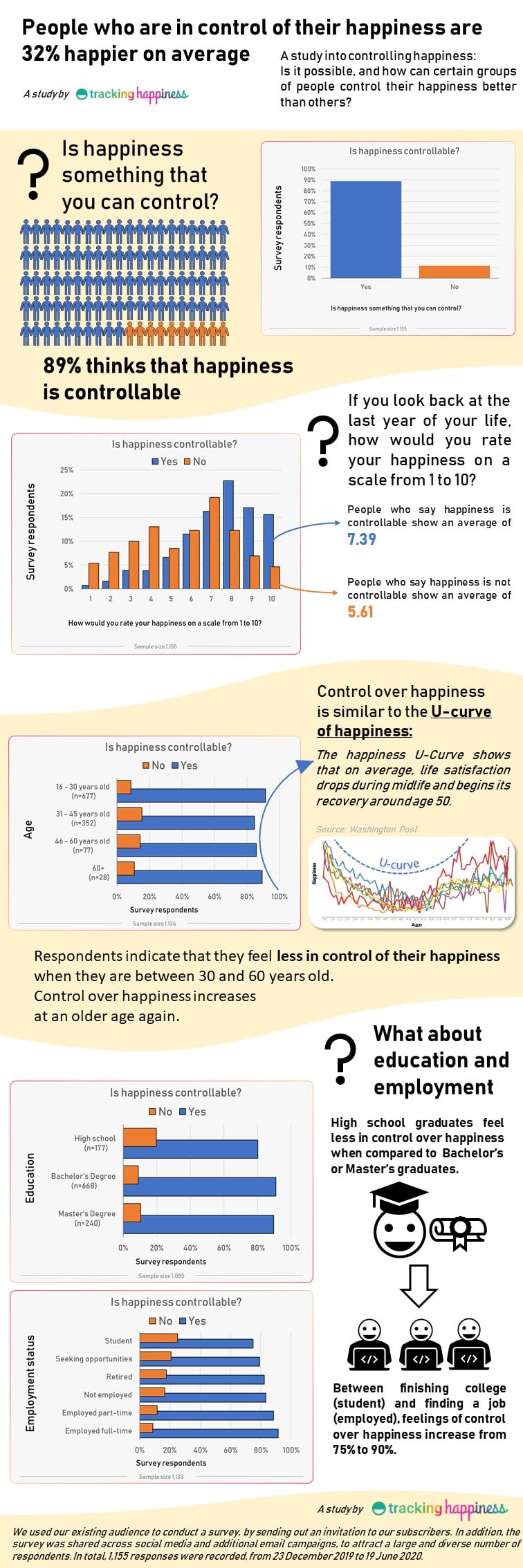
A good start. I emigrated from a country where I had no opportunity for input into society to one so highly regulated that I have little input.
So I need to change my mindset and expectation.
Looking forward to what you have in store.
I’m happy to hear that, Willem!
Every opinion counts whether one agrees with the other or not! As long as what one is saying is what he feels and believes is the case with his/her happiness trends. Life is all about choice and the decision we create/make. So am happy to share and consider/respect other people’s
thoughts, feelings, and beliefs. A lot to do with Empathy and resilience also. This article/survey is so useful and does contribute to the study of Happiness! Thank you, Hugo!
Thanks for the kind words, Boio-Bess!
I feel happier! This article reminds me to Identify what things in life can be controlled and what cannot. People who are unhappy, tend to put all their eggs in one basket, focusing first, (and mostly), on those things they cannot control. Thus, the elusive “butterfly of happiness” chase will have to continue for some. Certain individuals will refuse to stop trying to control people, places and things that are actually out of their reach and ability to affect. This process will lead most of us down the garden path of resentment- and later- to an eternal resting place of unhappiness.
That is very well said, thanks for sharing this! I’m glad you found our article interesting!